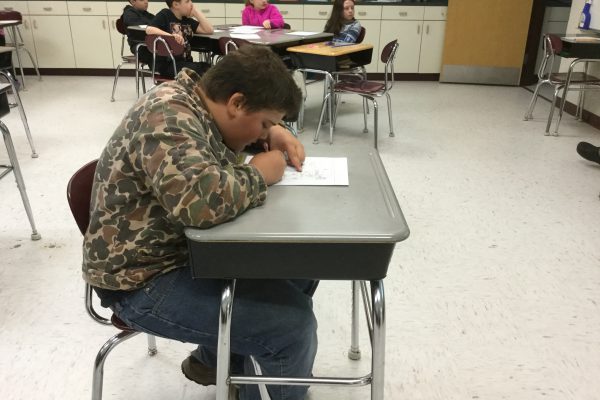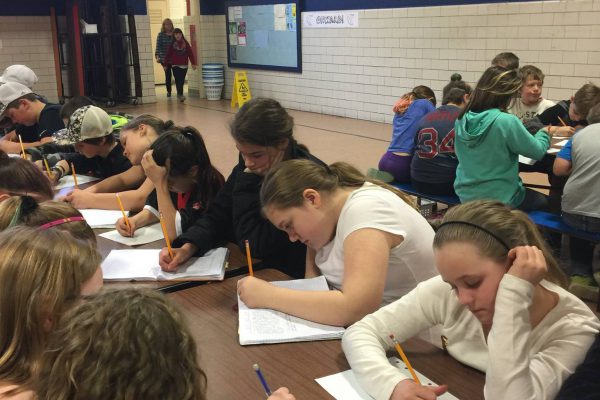
Research shows that literacy skills are one of the strongest indicators of a child’s future success. But literacy isn’t just reading; writing effectively is an essential skill for success in school and in life, and has a lot of social and emotional benefits, too. Writing can help kids (and adults!) process their feelings, destress, and boost memory and creativity, while honing those communication and comprehension skills. Want your kid to go to college? They’re going to have to learn to write essays and papers, regardless of what they study. Want to help them get a good job? Writing a solid cover letter and resume, as well as effective and error-free communications with a potential employer, are essential. Encouraging good writing skills in your child is one of the best ways you can set them up for success. It doesn’t matter WHAT they write; a regular writing practice will help them improve their skills – plus, it’s fun!
When I was a kid, I loved to read, and that translated into a love of writing, too. I enjoyed creating my own stories and spent hours filling up notebooks with my fantasies. My first grade teacher, Mrs. A, told me I could become a real author someday and her encouragement inspired me to keep writing. As a depressed teen, writing poetry was one of the ways I processed my complex emotions, even if I didn’t share those poems with anyone. In a high school creative writing class, my teacher told me, “If you work really hard, you could make a career out of this.” So I worked really hard. I studied poetry and fiction in college, then got my MFA in Fiction. I’ve won awards, been nominated for a Pushcart Prize, and have an anthology of mental health recovery stories I edited coming out this spring. My publication success is the product of a persistent, dedicated writing practice and not giving up, and none of it would have been possible without those early teachers – and my family – encouraging me.
So how can you help foster creativity and effective writing skills in aspiring young writers?
In the classroom:
Have your students write regularly. Dedicate seven to ten minutes to writing at the beginning of each class, either in response to a prompt, or a free write about whatever’s on their mind. You don’t need to read this work, though you can give them the opportunity to share what they’ve written if they’re ready. Make writing a regular practice and a way to process what they’re going through.
Assign critical responses about the material they read/hear in class. This encourages developing critical thinking skills and teaches them to assert a thesis and support it with opinions and quotes/evidence.
Assign creative writing. You can use prompts/themes or be open-ended. They’ll practice conveying ideas, stimulate their imaginations, and have fun concocting their own stories or poems. Have them revise their work throughout the semester and compose a book (either through simple cardstock/construction paper or, if possible, in a printed format) so they can share their creative work with their classmates.
Create a positive, encouraging workshop space. In my work coaching writing with college students (and even adults!), it surprises me how many of them have never been in a workshop setting where they heard constructive feedback on their work and learned how to revise. This will be essential to their academic and professional success, so introduce these skills early. Have them share their work with the class and encourage a positive workshop setting where you discuss the pieces. You can assign three or four students to share work each class and spend a few minutes discussing each piece, what works well/what you love, and what can be improved. Be specific and actionable. “I didn’t like that part” doesn’t help the writer much.
It will be hard for most writers to hear feedback on their work at first. They may feel self-conscious or embarrassed. In a high school weekend program I taught, in our first workshop, I could tell one student looked nervous and he excused himself shortly before his work was supposed to be workshopped. He didn’t come back all class and I found him literally banging his head against the wall. I assured him he didn’t have to share anything he didn’t want to, and he asked if he could share the work with just me. I gave him feedback and, after dinner, he asked if I’d read his next draft. He worked on it all weekend and, in our final workshop, shared it proudly.
Make sure they know that a critique on their work isn’t a critique on them and that even the best of writers can always improve their work. Writers revise many drafts before publishing. Be encouraging and supportive. Always start with the positive. Use the compliment sandwich method: I loved this part/how you did this, I’d like to know more about that bit, the ending really made me want to read more.
Before students share work, lay out ground rules for the workshop. We will be positive and encouraging. We will not insult the writer. We will not interrupt each other, et cetera. Teach them what a helpful critique is – motivating, supportive, specific and actionable – something they can actually change. And have them share the next draft and discuss how it improved.
You’ll see students’ skills transfer to other areas. Learning how to write teaches you how to read and vice versa. Reading and writing go hand in hand. By workshopping their creative writing, students will learn about literary devices like plot, dialogue, summary/exposition, description, character development, theme, and metaphor (or, for poetry, line breaks, imagery, voice, etc.). They’ll learn how to read more critically, ask questions, and analyze the writer’s work. Also, when creative writing improves, so does critical/analytical writing. Writing a short story or poem – and revising based on feedback – helps in writing persuasive essays or research papers, and, in the future, e-mails and letters, reports and memoranda, essential things for many jobs.
At home:
Help your young writer find books they like and want to emulate their own work after. Take them to the library or bookstore or troll book sales. Read what they read (together or own your own) and discuss it. Ask them open-ended questions, like why they liked or didn’t like certain parts. Ask them what the writer did well, and what they’d do differently. Encourage them to write fan fiction (fiction based on an existing book/series) and rewrite their own ending.
Ask to read (or listen to them read) their writing. If you see them scribbling away every day, say “I’d love to read that whenever you’re ready.” Don’t put pressure on them; they may want to make it perfect for you. Make sure to compliment their writing and be specific. “I loved that character’s dialogue, he was so funny” or “your descriptions of that place as ‘x, y, and z’ were so beautiful and detailed.”
Regularly ask how the work is going, if they’re having trouble with something or feeling stuck. Help them talk through it. Ask questions. Support their ideas. Tell them it sounds really interesting or cool or creative (or whatever). Tell them every writer ever has struggled with writer’s block or imposter syndrome (I’m not good enough, I’m not a real writer, I don’t know how to do this). It just takes practice. A lot of practice. And tough skin.
Show your pride in their work. Help them make booklets, either simply using construction paper and twine to bind them, or, if you can, by printing them at Staples or any number of online services. Display their work on a bookshelf. Tell them how creative they are, how smart and observant and talented. Let them hear you tell others they wrote an amazing story or poem. Make sure they know you’re proud.
If they’re ready/want to (and not if they don’t!), help them find places to submit their work. Encourage them to submit to the NH PBS Kid’s Writing Contest or, for older/more advanced writers, to the Young Writers Project. Celebrate them for being brave enough to submit their work. Honor their accomplishments.
With your support, your aspiring young writer’s creativity and confidence will thrive and they’ll keep writing and improving those all-important literacy skills. Writing can give them a positive outlet now, while preparing them for a bright future.
Erika Nichols-Frazer is a writer, editor, and the Communications Manager of the Children’s Literacy Foundation. She is the Editor of A Tether to This World (Main Street Rag, May 2021), an anthology of mental health recovery stories. Her work has been published in HuffPost, Red Tree Review, Burningword Literary Journal, Lunate, Noir Nation, and elsewhere. She can be found on Twitter, Instagram, and Facebook @enicfraze or at www.nicholsfrazer.com.



